Many of us are busy harvesting a tomato crop and putting in a late season crop as well. Today I am excited that we have Liberty County UGA Extension agent, Ashley Hoppers, joining us to talk tomato harvesting.
Happy Gardening!
Empowering Georgia through UGA Extension
Many of us are busy harvesting a tomato crop and putting in a late season crop as well. Today I am excited that we have Liberty County UGA Extension agent, Ashley Hoppers, joining us to talk tomato harvesting.
Happy Gardening!
Although the thermometer is rising above ninety on a daily basis and our Georgia humidity is, well, the typical Georgia humidity, it is time to do some serious thinking about your fall garden.
Did you make notes on your summer garden? Making notes about which varieties performed well for you, what pests plagued you, and your overall satisfaction from your warm-season garden will be useful as you plan for 2020. Also, make note of plant arrangement so you can practice crop rotation next year.
Think Green. Fall is the time for lettuce, spinach, collards, mustard greens and kale. Your seed catalogs will show you that there are so many varieties of lettuce that you couldn’t possibly grow them all. Do try a few new ones. They could make a real difference in the taste of your salads. I really enjoy the lettuce variety Drunken Woman!
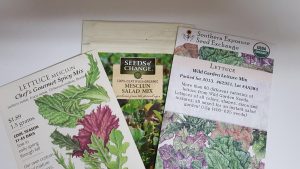
Bush beans can be a part of your early fall garden. A planting of bush beans towards the end of summer may produce a nice crop for you if we don’t get an early frost. Take note of the days until harvest count and look for something in the lower numbers. Look for varieties that are resistant to rusts and keep a close eye on them for pests like Mexican bean beetles.
Don’t forget root crops. Short day onions and garlic are a MUST for any cool-season garden. Plant these root crops as sets and let them go until the spring. It is easy to grow all the garlic you will need for the year by careful planning. Make sure to mulch the crop.
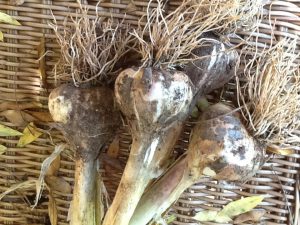
Finally, if you don’t plan to grow a cool-season crop consider growing a cover crop. Cover crops can hold down weeds while enriching your soil. At the very least please be courteous to your fellow community gardeners and clean out your plot, removing plant debris that could harbor pests and weeds that could produce seeds that you will deal with later.
Cooler weather is on the way! Happy Gardening!
On Thursday, June 27th, a bipartisan group of Congressional leaders introduced the Farm to School Act of 2019 (H.R. 3562, S. 2026). The bill, which is co-sponsored by Georgia’s own David Perdue, will expand funding and opportunities for farmers and educational institutions through the USDA Farm to School Grant Program.
The Farm to School Act would:
Increase annual funding to $15 million and increasing the grant award maximum to $250,000.
Advance equity by prioritizing grants that engage diverse farmers and serve high-need schools.
Fully include early care and education sites, summer food service sites & after school programs.
Increase access among tribal schools to traditional foods, especially from tribal producers.
The Farm to School Grant program has turned away approximately 80% of qualified applicants due to lack of funds so this new bill comes at a good time. The farm to school movement is truly a grassroots effort. Georgia’s Farm to School Network is made up of several collaborative partners working on school nutrition, farmer opportunity, and school gardens.
This bill goes hand-in-hand with the Georgia Agricultural Education Act (Georgia State Senate Bill 330) which was signed by Governor Nathan Deal in 2018.
It is exciting to see these forward steps in agricultural education.
Happy Gardening!
Around the July 4th holiday it is fun to think about our collective American history. Gardens have always been a part of that. The Victory Garden movement during World War II is fascinating.
A shortage of farm labor developed during World War II that made it difficult to get crops harvested. Add to that the gasoline and rubber shortages which made it difficult to get the crops to the market. In response the US government started promoting Victory Gardens, encouraging people in more urban environments to grow food crops.
It is estimated that 20 million Americans did their gardening duty and produced 9-10 million tons of food. This equated to roughly half the vegetables grown in the US at that time. This initiative also freed up canned goods for the troops.
Schools even got involved creating school Victory Gardens.
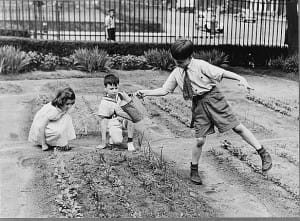
Businesses jumped on board this promotion. One popular Coca-Cola advertisement stated, “There is a Victory Garden in almost every back yard this summer, growing food and vitamins for the family. The owners are so proud of their vegetables as of their specimen roses or dahlias. Friends in work clothes come over to admire and compare crops. They eat tomatoes right off the vine and crunch carrots fresh from the earth.” The advertisement goes on to say that serving Coca-Cola is the correct hospitality in a Victory Garden.
The US government encouraged Victory Gardens during World War I as well but the movement wasn’t as massive. This Department of Agriculture and Commerce promotion from that time is almost comical. Who is this woman suppose to be? Notice the expression on her face and her very toned arms. Who gardens in sandals? She is going to have alot of thinning to do if all those seeds germinate.
I would like to have a copy of the books advertised at the bottom of the poster: Write to the National War Garden Commission ~Washington, D.C. for free books on gardening, canning, and drying.
After World War II the interest in home vegetable gardening waned. It seems people were interested in peacetime activities and conveniences, including purchasing vegetables at the market.
Vegetable gardening is a large part of our American heritage. From colonial kitchens to victory/war gardens to community gardens to a garden at the White House. It is great to be a part of it.
Happy 4th of July!
On Monday I was privileged to be part of a Community/School/Charity Garden Symposium in Hendersonville, North Carolina sponsored by Steve Pettis of North Carolina Cooperative Extension. One of the presenters was John Murphy, the director of Bullington Gardens. His lecture was so impressive that I wanted to share a bit of it with you.
Bullington Gardens is located in Hendersonville and is a partner with North Carolina Cooperative Extension and Henderson County Public Schools. Mr. Murphy has a Master of Science degree in horticulture and is a registered horticultural therapist and a certified teacher. He puts these skills to good use when he works with his passion of helping challenged students in the garden.
Over 10% of Henderson County students are challenged learners. For those students with physical challenges John works with them on pushing their boundaries using the garden as the setting. For one student holding a trowel was a challenge but being in the garden and possibly working in the soil was motivation and over time that student held that trowel. This is just one of many successes at Bullington Gardens.
John also works with students who have communication challenges and those in high school who are being groomed to head to the work place. He hosts a group of intern workers each year who are asked to design a garden at the end of their experience. At the beginning of the internship several students feel that task is impossible. By the end, with the help of John and his volunteers, the garden projects are completed and the students are awed at what they can do. John says his goal is to bring joy to those students who work in the garden and he certainly seems to do just that.
As community gardeners we know that the garden is powerful. The group at Bullington Gardens just gave us another reason why.
Happy Gardening!
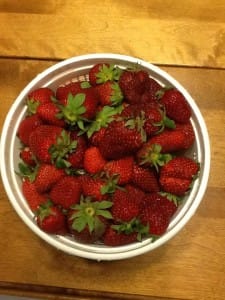
Several of you have asked me to re-run this post about making strawberry jam. The strawberries are plentiful around Georgia this year and I made jam myself this weekend. Actually, Cindee says what I make is really spreadable fruit because I don’t use pectin. Cindee is the expert. Enjoy your strawberry crop and have fun making jam!
Applications are now open for the 2019 Golden Radish Award, Georgia’s premier farm to school award. Presented by Georgia’s Departments of Education, Agriculture, Early Care and Public Health, University of Georgia Cooperative Extension, and Georgia Organics, the Golden Radish Award is given to school districts and Local Educational Agencies (LEAs) who are doing extraordinary work in farm to school. Awards will be given at the Mercedes Benz Stadium on Sep. 17, 2019.
Is your district planning to apply? Ask your school nutrition director, curriculum coordinator, and superintendent if they are planning to apply for the Golden Radish and share this information with them:
• Applications are due on June 28, 2019.
• Platinum, Gold, Silver, Bronze, and Honorary Radishes will be awarded to recognize school districts/LEAs with varying levels of farm to school programs. In addition, the Outstanding Award will recognize the district/LEA with an outstanding farm to school program in 2018-19.
• The online award application is user friendly, has save and return capability, and allows for multiple collaborators.
• Educators and staff in Golden Radish Award districts are eligible for reduced price farm to school professional development and training opportunities throughout 2019-20.
• Application details, award criteria, and examples of programs and activities that meet the criteria requirements are available at https://georgiaorganics.org/for-schools/goldenradish.
• Learn more about the 84 school districts across Georgia that were awarded Golden Radish Awards last year: https://georgiaorganics.org/84-georgia-school-districts-win-golden-radish-awards-for-farm-to-school-accomplishments/
• Questions? Contact Kimberly Della Donna at kimberly@georgiaorganics.org or 404-481-5014.
Fresh slicing cucumbers are a favorite summer crop. Extension Horticulturist, Robert Westerfield, has written a helpful circular called “Growing Cucumbers in the Home Garden” that will get you started.
Slicing cucumbers may have long vines. With proper planning, and a few tips, you can have manage cucumber vines in the community garden. There are a few cultivars that are bush-type cultivars, meaning they won’t take as much space. Salad Bush Hybrid is advertised to take up about 1/3rd the area of a traditional vining cucumber. Bush Crop and Fanfare are also commonly grown bush cucumbers. Realize that they will still have some vines.
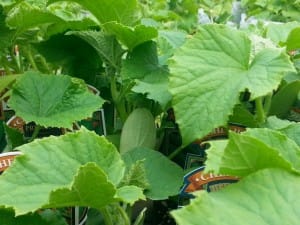
If you want to try the vining cultivars you can stake or trellis them. Wire-grid growing panels are perfect for cucumbers. Or, recycle a portion of fencing. Trellising cucumbers has the added advantage of getting the fruit off of the ground which helps prevent fruit rots. This also allows for increased air flow around the plant leaves which may cut down on disease problems. Be conscientious of your fellow gardeners by not creating unwanted shade for your neighbor with your trellis.
Depending on how large your cucumber fruit matures, it may need support on the trellis. Old panty hose or onion bags are perfect for this. As the fruit becomes big, gently cup the cucumber in the hose or onion bag and tie it to the trellis. Be careful not to bruise the fruit or tear it from the vine. Burpless hybrid, Straight Eight, Sweet Success, Sweet Slice, Diva, and Marketmore 76 are good vining cultivars for Georgia.
Community gardeners list past poor fruit quality as a reason not to grow cucumbers. If you know a bit about the biology of the cucumber plant you might have better success. Cucumbers have two kinds of flowers. They have male (staminate) and female (pistillate) flowers. Staminate flowers do not bear fruit. Bees move pollen from staminate (male) flowers to the
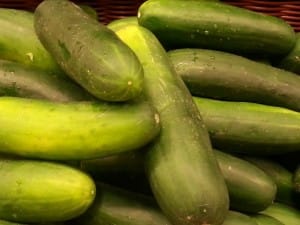
pistillate flowers for pollination and subsequent fruit production. This means if you, or your fellow gardeners, are using broad-spectrum insecticides you may be reducing the quality and quantity of your cucumbers by killing possible pollinators. It is possible to hand pollinate cucumbers if you see few bees.
You may have heard of gynoecious cucumbers. These produce mostly female flowers. They often have a heavier yield because of the increased number of female flowers. I’ve seen posts around the web suggesting that the few male flowers be removed. Don’t do that! It takes male and female cucumber flowers to make fruit! General Lee and Calypso are two gynoecious types worth a try.
Be bold and try cucumber planting. Your salads will be the better for it! For more information on growing cucumbers with success contact your local UGA Extension Agent.
Happy Gardening!
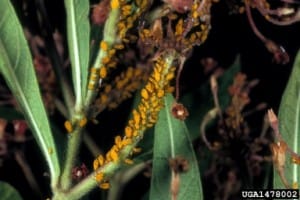
Do you have aphids in your garden? If so, are they a problem? Spring when many plants have succulent, new growth is prime aphid time.
Aphids, also called plant lice, are soft-bodied, pear shaped insects with tail-like appendages known as cornicles. Most aphids are about 1/10th inch long and can be several colors: green, black, pink, brown. If you have trouble identifying your pest, contact your local UGA Extension agent.
Aphids use “piercing-sucking” mouthparts to suck the juices out of tender plant parts, secreting a sticky substance known as honeydew. Ants are attracted to honeydew and will often protect the aphids making it. Black sooty mold grows well on honeydew and is difficult to remove from
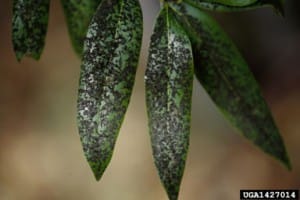
the leaves. This sooty mold makes photosynthesis almost impossible on the leaves affected. All this means that aphids can be a problem to the community gardener.
They can:
Right now our gardens are full of leafy, new plant growth and as the temperatures warm up, check the underside of
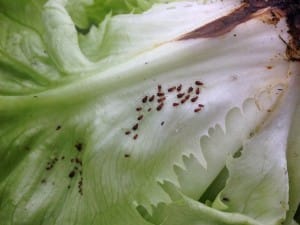
leaves and terminal buds for aphid pests. Look for those tail-like appendages. (Some people call them tailpipes!) Also pay attention to ant trails. They may lead you to the honeydew making aphids.
Since aphids tend to congregate as a group, you can try removing the one or two leaves where you find them. Sometimes a good spray with the hose is enough to remove the insects. If not, insecticidal soap is a good choice. Sometimes I can just wipe them off with a wet paper towel.
Beneficial insects are nature’s way of controlling aphids. So avoid applying any chemical insecticide that could harm those beneficials. Some of the natural predators include lacewings or lady beetles (lady bugs). You can actually purchase lady beetles from insect distributors but once you get them you can’t control where they fly.
Wishing you an aphid-free spring!
Happy Gardening!
This Saturday, May 4th is the 5th Annual Soil Festival. Soil Festival is an annual tradition of celebrating soil as a key source for building gardens and healthier communities. This year a brand new Community Compost Learning Lab, the first of its kind in metro Atlanta, will be unveiled.
This free event is for all ages and raises awareness of the benefits of using local compost to improve and maintain high quality soil and to grow healthy food. This year, all attendees are encouraged to bring kitchen scraps to the event to support the production of healthy soil in Atlanta.
Soil Festival 2019 will be held at Truly Living Well’s Collegetown Farm in Atlanta, and includes a host of exciting opportunities for school gardeners, community gardeners, backyard gardeners, urban farmers, educators, beginning gardeners and children!
Never been to a farm? This festival is for you, too!
This year’s Soil Festival will feature educational workshops on gardening and composting; a children’s corner with fun garden-based activities and story time; a variety of urban agriculture vendors to learn tools of the trade from; a petting zoo; and free bags of compost for your garden.
We will also be providing great music and complimentary farm-to-table food and fare. Dig in, meet fellow gardeners, and visit all of the exhibitors who will be sharing resources and tools to help you enjoy the successes of gardening.
Registering for free tickets is encouraged.
See you there!